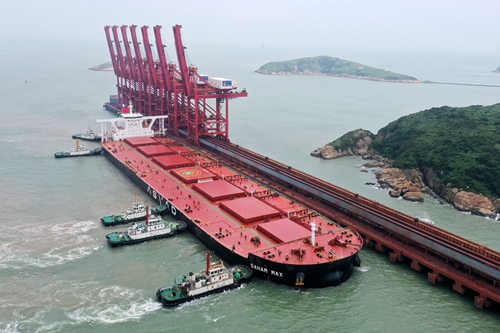Chinese ports deny rejecting cold food container ships
By GT staff reporters Source: Global Times Published: 2020/7/21 18:33:40

SAHAM MAX, a bulk carrier with a 400,000-ton capacity, approaches the Shulanghu ore transit dock at the Ningbo Zhoushan port on Sunday. In the first half of the year, it handled 16.07 million tons of cargo, up 24.3 percent year-on-year, achieving 51.9 percent of the goal set for the year. Photo: cnshphoto
Major ports in China have seen slower customs clearing for frozen food due to strict anti-virus and testing measures, on the back of a cluster of coronavirus cases linked to a wholesale food market in Beijing, and positive testing results of some imported frozen meat and seafood.
But no Chinese port has rejected any container ship, or asked vessels to divert to other destinations, and the backlog is gradually reducing as the outbreak eases and the capacity at refrigerated container depots has expanded.
"The Shanghai port accepted imported food container ships as usual, but clearing efficiency has dwindled a lot as local authorities stepped up the inspection of frozen food, and scaled up disinfection," an employee at the port of Shanghai told the Global Times Tuesday on condition of anonymity.
The employee added that the inspection process could incur additional costs, which cargo owners need to shoulder. Shanghai port is the world's largest container port.
Another source at the port of Guangzhou, South China, confirmed there was slowed customers clearance there, saying "almost all ports are facing the same congestion as COVID-19 checkup is enhanced."
A manager surnamed Yang from a large seafood import company based in North China's Hebei Province told the Global Times that staff at Tianjin port had disinfected every imported container manually, which has extended the clearance process.
Reuters reported at the weekend that import container pick-up activities have been impacted in the port of Yantian in Shenzhen, South China's Guangdong Province as well as Ningbo port in East China's Zhejiang Province, as a result reefer plugs are highly utilized. It also quoted Danish shipping line Maersk as saying that the firm has diverted cargo from Yantian because of limited reefer plugs. A reefer is a refrigerated container which needs to be connected to an electricity supply to maintain the temperature.
Yantian port denied the claim and said it had never rejected any reefer container, even when inspection rates peaked and slots for refrigerated containers were limited. The port is one of China's top ports for frozen meat.
Yantian port said it has upgraded the infrastructure to add 35 percent more plugs for refrigerated containers.
The source at the port of Guangzhou told the Global Times Tuesday that the refrigerated container depot at the port's Nanshan wharf can accommodate a large number of refrigerated containers due to the low utilization rate.
Yang noted that the cargo clearance has largely speeded up in recent days as domestic ports try to solve the backlog.
For example, in recent days an average of 150 containers of goods cleared customs each day at Tianjin port, compared with only about 20 containers in previous weeks, when the discovery of coronavirus on the packaging of imported frozen seafood triggered the stricter customs inspection process.
"In the past several weeks, companies had to wait two weeks for goods to be cleared, but now it's down to about three days," he told the Global Times, although he added that this is still longer than before the pandemic, when goods were cleared the same day they arrived.
Recently, a number of packaging samples of imported shrimps from Ecuador have tested positive for coronavirus, according to China's General Administration of Customs.